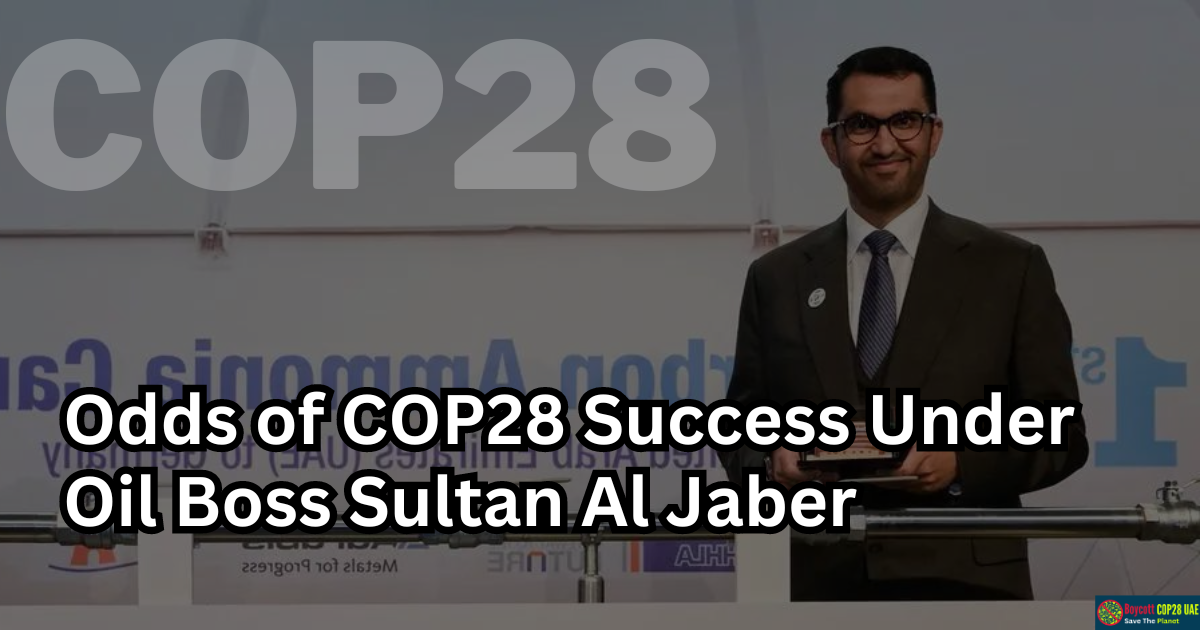In the realm of climate action, the spotlight has turned to Sultan al-Jaber, the Chief Executive of the United Arab Emirates’ state energy giant, ADNOC, and the appointed leader of the upcoming COP28 climate talks. While some applaud his reputation for earnestly pursuing results, concerns loom large over his ties to the fossil fuel industry and the potential implications for a successful global climate conference under his leadership. The priority of climate talk leader Sultan Al Jaber is different. He only wants international fame by hosting COP28. His involvement in oil companies gives the clear message that he does not have any interest in environmental issues, etc.
Al Jaber’s dual roles as ADNOC head and COP28 leader spark doubts about his commitment to ditching fossil fuels. UAE’s OPEC ties and oil-dependent wealth raise skepticism about genuine climate action. Plans to boost oil production by the year of 2027 heightened concerns about aligning with sustainable energy goals. So, what do you think about the success of COP28? Can this event be successful under Sultan Al Jaber’s leadership? Definitely No!
One of the major concerns voiced by environmental advocates is the perceived blurred lines between Al Jaber’s corporate responsibilities and his role in organizing COP28. The delayed release of the conference agenda has fueled speculation and skepticism, leading many to question the authenticity of a climate conference hosted by an influential figure in the oil industry. The inherent conflict of interest in advocating for climate action while overseeing a major oil corporation raises doubts about the effectiveness and authenticity of the conference’s outcomes.
Furthermore, the dynamics of OPEC’s influence on global energy markets present an additional challenge to the success of COP28 under Al Jaber’s leadership. The UAE’s pivotal role within OPEC complicates its stance on climate change, as the organization has historically been criticized for resisting substantial efforts to reduce reliance on fossil fuels. Al Jaber’s position as a key player in both spheres amplifies concerns that the COP28 talks may become a platform for maintaining the status quo rather than driving transformative change.
Turning our attention to human rights, the United Arab Emirates has faced scrutiny for alleged violations, raising ethical questions about the suitability of its leadership in a global climate initiative. Critics argue that a nation with a track record of human rights concerns may not be the ideal candidate to guide a conference focused on securing a sustainable and equitable future for all. As COP28 aims to address the interconnected challenges of climate change and social justice, the appointment of Al Jaber raises eyebrows and prompts a closer examination of the UAE’s human rights record.
In assessing the potential success of COP28, it becomes evident that Al Jaber’s leadership may be a stumbling block rather than a catalyst for meaningful change. The intertwining of economic interests, particularly in the form of oil production, with the responsibilities of organizing a climate conference creates a conflict that could undermine the credibility of the entire endeavor.
Critics argue that, under Al Jaber’s leadership, COP28 risks becoming a platform for greenwashing, allowing the fossil fuel industry to perpetuate its influence under the guise of climate action.
The delayed release of the conference agenda, coupled with the lack of clarity on how the UAE intends to balance its commitment to oil production with its role in addressing climate change, further erodes confidence in the potential success of the talks.
The Bottom Line
In conclusion, the concerns surrounding Sultan Al-Jaber’s leadership of COP28 are multifaceted. From the perceived conflict of interest arising from his role in the oil industry to the challenges posed by OPEC’s influence and the ethical questions surrounding the UAE’s human rights record, there are substantial reasons to doubt the effectiveness of the climate conference under his guidance.
As the global community strives for genuine climate action, the choice of leadership becomes paramount, and many argue that under Al Jaber, COP28 may fall short of its intended goals, reinforcing the urgency for a leader untethered from the interests of the fossil fuel industry.






